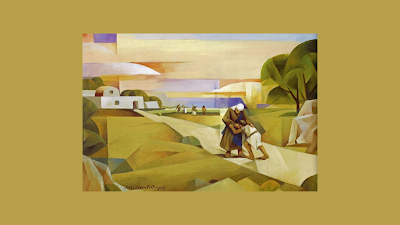Trio of Lost Stuff
Three Parables of Jesus and each in the gospel of Luke. A Trio of Parables — A Lost Stuff. In these stories Jesus shares three illustrations. He told these sermons after the Pharisees and scribes criticized Him for associating with sinners who had come to hear Him. These stories are back to back to back and similarly themed.
For some reason the Prodigal Son usually gets told as a stand alone story, and with merit, but it’s still one of the triplets. The Parable of the Lost Sheep, The Parable of the Lost Coin and The Parable of the Lost Son, three things happen: Something is lost; the loss leads to a search, and finding brings celebration and rejoicing.
The parable of the lost sheep and the parable of the lost coin are basically the same story. Each begins similarly: Suppose one of you …
In each, something is lost, searched out, and found. Both parables include similar language towards the conclusion: “Rejoice with me; I have found my lost — sheep or coin.
Jesus is making a few simple points, each including an action - searching, finding and rejoicing. The metaphor is fairly clear: God’s love is excessive, extravagant, lavish, boundless and without restraint. I wonder if the sinners and tax collectors They were the lost sheep, the lost coin. I wonder if the sinners and tax collectors gathered around must have understood Jesus was referring to them.
The parables of the Lost Sheep and the Lost Coin prepare us for the parable of The Prodigal Son - The Lost Son. Again, something, more correctly someone, is lost. But we gain more insight as we listen to Jesus. The lostness of the younger son is no accident. It was willful. His choice. The story is not difficult to follow. The youngest son chooses his father’s money. He chooses self discovery and vices and pleasure. The prodigal son also chooses to come home.
There's an interesting twist in the story. Earlier I mentioned that the audience who heard Jesus' stories included the Pharisees and scribes. This piece of Jesus parable begins like this: “Meanwhile, the older son was in the field. When he came near the house, he heard music and dancing . . The older brother became angry and refused to go in..."
Here's where I land on this particular parable. At the end of the prodigal son story, it is the son who never left who is outside the father's house. He's the twist and the surprise to object lesson at the end of this story. We don’t know if the elder son goes inside. We don’t know if the older brother celebrates, or if he remains focused on: himself, past obedience, what he’s done, what he has not received.
We are all being called into the house. Come.
The Spirit and the bride say, “Come!
What are your thoughts?
